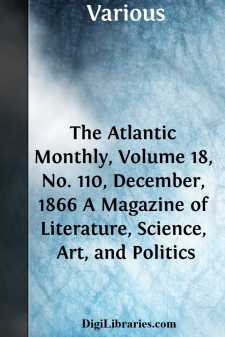Categories
- Antiques & Collectibles 13
- Architecture 36
- Art 48
- Bibles 22
- Biography & Autobiography 815
- Body, Mind & Spirit 144
- Business & Economics 28
- Children's Books 18
- Children's Fiction 14
- Computers 4
- Cooking 94
- Crafts & Hobbies 4
- Drama 346
- Education 58
- Family & Relationships 59
- Fiction 11829
- Games 19
- Gardening 17
- Health & Fitness 34
- History 1378
- House & Home 1
- Humor 147
- Juvenile Fiction 1873
- Juvenile Nonfiction 202
- Language Arts & Disciplines 89
- Law 16
- Literary Collections 686
- Literary Criticism 179
- Mathematics 13
- Medical 41
- Music 40
- Nature 179
- Non-Classifiable 1768
- Performing Arts 7
- Periodicals 1453
- Philosophy 65
- Photography 2
- Poetry 896
- Political Science 203
- Psychology 44
- Reference 154
- Religion 515
- Science 126
- Self-Help 85
- Social Science 82
- Sports & Recreation 34
- Study Aids 3
- Technology & Engineering 59
- Transportation 23
- Travel 463
- True Crime 29
Our website is made possible by displaying online advertisements to our visitors.
Please consider supporting us by disabling your ad blocker.
The Atlantic Monthly, Volume 18, No. 110, December, 1866 A Magazine of Literature, Science, Art, and Politics
by: Various
Categories:
Description:
Excerpt
JOHN PIERPONT.
Most men of "fourscore and upwards," like Lear, and who, like Lear, have been "mightily abused" in their day, are found, upon diligent inquiry, to have long outlived themselves, like the Archbishop of Granada; but here is a man, or was but the other day, in his eighty-second year, with the temper and edge and "bright blue rippling glitter" of a Damascus blade up to the very last; or rather, considering how he was last employed, with the temper of that strange tool, found among the ruins of Thebes, with which they used to smooth and polish their huge monoliths of granite, until they murmured a song of joy, whenever the morning sunshine fell upon them.
This remarkable man—remarkable under many aspects—died at Medford, Massachusetts, on Monday morning, August 27th; and it is now said of heart-disease,—that other name for a mysterious and sudden death, happen how it may, and when it may. He had been perfectly well the day before, attended church, and called on some of his neighbors; he retired to rest as usual, and nothing more was heard of him till Monday morning, when he was found asleep in Jesus, prepared, as we humbly trust, to hear the greeting of "Well done, thou good and faithful servant!" Says a friend, in a letter now lying before me, of August 27th: "On Saturday afternoon, day before yesterday, your friend and my friend, Rev. John Pierpont, called upon me, and we had a very interesting interview of about an hour. I never saw him look better or appear happier. Although eighty-one years of age the 6th of last April, he seemed to have the elasticity of youth, and he was perfectly erect. I gave him what he wanted very much,—a copy of his trial before an ecclesiastical council in this city, several years ago. He gave me his photograph, and, taking his gold pen, wrote underneath, in a beautiful hand, 'John Pierpont, aged 81.' He said he was doing some work at Washington, which he hoped to live long enough to complete.... When I published my last book, I sent him a copy. He acknowledged the receipt of it in a letter of eight or ten pages, which is now a treasure to me. His name on the photograph was probably the last time he ever wrote it,"—another treasure, which my friend would not now be likely to part with for any consideration.
My acquaintance with Mr. Pierpont began in the fall or winter of 1814, just when the war had assumed such proportions, that men's hearts were failing them for fear, and prodigies and portents were of daily occurrence. New England too—finding herself defenceless and left to the mercy of our foe—began to think, not of setting up for herself, not of withdrawing from the copartnership, without the consent of the whole sisterhood, but of coming together for conference and proposing to the general government, not to become neutral after the fashion of Kentucky, in our late misunderstanding, not of playing the part of umpire between the belligerents, like that heroic embodiment of Southern chivalry, nor of holding the balance of power, but, on being allowed her just proportion of the public revenues, to undertake for herself, and agree to give a good account of the enemy, if he should throw himself upon her bulwarks, whether along the seaboard, or upon her great northern frontier.
He had just escaped from Newburyport, after writing the "Portrait," a severe and truthful picture of the times, which went far to give him a national reputation—for the day; and opened a law office at 103 Court Street, Boston, where he found nothing to do, and spent much of his time in cutting his name on little ivory seals, and engraving ciphers—"J.P."—so beautiful in their character, and so graceful, that one I have now before me, an impression taken by him in wax, with a vermilion bed,—for in all such matters he was very particular,—were enough to establish any man's reputation as a seal engraver. It bears about the same relationship to what are called ciphers, that Benvenuto Cellini's flower-cups bore to the clumsy goblets of his day.
He was never a great reader, not being able to read more than fifty pages of law and miscellany in a day, though he managed, for once, while a tutor in Colonel Alston's family at Charleston, South Carolina, beginning by daylight and continuing as long as he could see, in midsummer, to get through with one hundred pages of Blackstone; but the "grind" was too much for him,—he never tried it again. He read Gibbon, and Chateaubriand's "Genius of Christianity," and St. Pierre, and Jeremy Bentham's "Theory of Rewards and Punishments," but never to my knowledge a novel, a romance, or a magazine article, except an occasional review; but Joanna Baillie,—that female Shakespeare of a later age,—and Beattie, and Campbell, and the British poets, and dramatic writers, were always at hand, when he had nothing better to do, with no seals to cut, no ciphers, no razor-strops, no stoves, and no clients. Over that field of enchantment and illusion he wandered with lifted wings, month after month, and year after year.
At this time he was in his thirtieth year, and I in my twenty-second. No two persons were ever more unlike; and yet we grew to be intimate friends after a while; and at the time of his death our friendship had lasted more than fifty years, with a single interruption of a twelvemonth or so while I was abroad, which was put an end to by our letters of reconciliation crossing each other almost on the same day....












